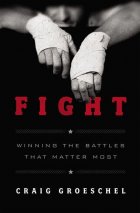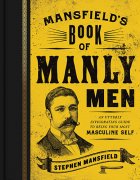 Guys, it’s time to unleash the godly warrior inside of you, and Fight by Craig Groeschel can help you do just that (you can read my full book review by clicking here). These are some of my favorite quotes from Fight—
Guys, it’s time to unleash the godly warrior inside of you, and Fight by Craig Groeschel can help you do just that (you can read my full book review by clicking here). These are some of my favorite quotes from Fight—
“The virtue of strength is determined by how it’s used. If it’s used to love and to protect, it’s good. Unfortunately, it can also be used to inflict harm, and that’s not consistent with what we see of God’s character in the Bible. He calls us to fight for what’s right. And a worthy is only as worthy as his cause.”
“Gentleman, God created you with the heart of a warrior. Until there’s something you’re willing to die for, you can’t truly live.”
“Men don’t plan to destroy themselves. The problem is that we have an enemy who does.”
“You have to stop trying to do it in your own strength. Because our spiritual enemy, satan, is an expert at making strong men weak. Fortunately, and don’t miss this, our God specializes in making weak men strong.”
“Lust says, ‘I want it.’ Entitlement says, ‘I deserve it.’ And pride says, ‘I can handle it.’ … You can fight using your own limited power. Or you can tap into the all-powerful, limitless God who wants to help you win every battle for His causes. Here’s how:
- Turn ‘I want it’ to ‘I want God.’
- Turn ‘I deserve it’ to ‘I deserve death.’
- Turn I can handle it’ to ‘I can’t handle anything without God.’”
“Pride is always born of our insecurities. When we don’t know who we are in Christ, we use pride to try to fill that void. … So many of us try to define ourselves by our accomplishments, to find worth in what we’ve done, instead of in Whom we belong to. We want to rely on our achievements, our victories, our trophies, our wins to define us instead of acknowledging God as the source of all good things in our lives.”
“If there’s one thing you can count on self-pity for, it’s exaggeration. Every time you start thinking about how bad things are, it’s like a game to make sure everything is as bad as it could be. You’ll catch yourself using extreme words like never, always, and forever.”
“We get stuck in these negative loops of self-judgment and condemnation that are not from God. His Spirit always leads us to confession, to changing directions and going God’s way, to a fresh start, to grace. Often God has forgiven us, but our emotions haven’t caught up. I’m convinced this is just another form of our pride—wanting to be in control of ourselves and not rely on God. We’d rather hate ourselves than risk the vulnerability and humility required to depend on Him. It seems easier to expect the worst than to put our hope in God.”
“If you let your need drive you to God, God will meet your deepest need. … When you return to God and give your weakness to Him, only then will your strength return. But it’s ultimately not your strength; it’s His strength.”
“If you’re a ‘real’ guy, then you’re supposed to be a sexual beast, a stud, a leader of the pack, a stallion the ladies can’t resist—right? Wrong. You’re supposed to be a man stronger than his physical urges or emotional responses. You’re supposed to be a warrior who’s willing to fight for something more important. And that’s a battle that’s fought one temptation at a time.”
“Don’t dare be strong in just business or at your job. Don’t dare be strong just in your hobbies or at some sport. Don’t dare settle for being strong just physically. Focus your strength on leading those around you into righteousness. … Don’t settle for being strong at what doesn’t last and weak at what does. Tap into the warrior within Don’t fight just the meaningless battles. Fight for what matters most. And fight for your life.”
“If you’re going the wrong way, stop. Stop now. Fall on your knees and fight like a man.”
“When we strip men of permission to fight back at the appropriate time, we emasculate them. We stifle the spirit of the warrior that God placed within them, the spirit that yearns to fight for what’s right. When men feel stripped of power, it’s that much easier to give in to temptation. If they’ve never learned to fight, then it’s hard to know how to fight the deadliest enemy of all.”
“Remorse is a common response to failure, but there’s a much better one: repentance. Instead of turning inward or deflecting outward, you turn upward. Instead of allowing yourself to get stuck, you stop and then let God move you through it. You drop the guilt, the regret, the anger, and the self-pity and return to the Lord. Repentance means owning up to your mistakes and accepting responsibility. … Remorse is a feeling based primarily on guilt (a selfish emotion), keeping our attention on the past. Repentance is turning away from that wrong, turning away from the past, and turning our attention to changing our future. Remorse builds an emotional monument to our sin, then stands there gazing at it while we feel bad. Repentance is turning one hundred eighty degrees away from our sin and then walking away from it. With each step, repentance moves farther away from that sin. And it doesn’t look back.”
“You are not what you did; you are who God says you are.”
“Giving your life one time is easy. You know what’s hard? Giving your life daily. Paul said, ‘I die every day’ (1 Corinthians 15:31). Real men give their lives daily.”
 When I was a kid, I couldn’t wait for “Martial Arts Theater” on Saturday afternoons! My friends and I would gather at my house with our snacks and watch a movie with outstanding martial arts action, and then run outside to try to practice what we had just watched. In these movies, I was always intrigued by the reluctant hero—the guy who had enough skill to snap your neck with his little finger, but who didn’t want to fight. When the bad guys finally crossed the line, our hero would instantly spring into action to restore peace. These are the memories that came flooding back into my mind as I read Erwin McManus’ latest book The Way Of The Warrior.
When I was a kid, I couldn’t wait for “Martial Arts Theater” on Saturday afternoons! My friends and I would gather at my house with our snacks and watch a movie with outstanding martial arts action, and then run outside to try to practice what we had just watched. In these movies, I was always intrigued by the reluctant hero—the guy who had enough skill to snap your neck with his little finger, but who didn’t want to fight. When the bad guys finally crossed the line, our hero would instantly spring into action to restore peace. These are the memories that came flooding back into my mind as I read Erwin McManus’ latest book The Way Of The Warrior.







